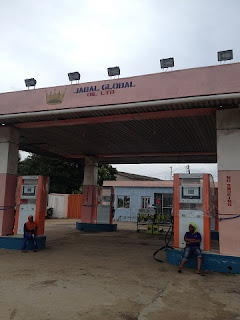 New findings have revealed that the market open price of petrol has hit N160 per litre. This is as a result of the landing cost that is within the region of N138 per litre.
New findings have revealed that the market open price of petrol has hit N160 per litre. This is as a result of the landing cost that is within the region of N138 per litre.
The Guardian, at the weekend gathered that the upward movement of the price was informed by the rise in the price of crude oil at the international market.
With the new development, the Nigerian National Petroleum Corporation (NNPC), which has now assumed the status of sole importer of petrol into the country pays about N750million daily on subsidy of petrol as the price modulation introduced in May last year finally crumbled.
NNPC pays additional N15 per litre on every litre of petrol as the national consumption figure hits 50 million litres during the yuletide period. However, this consumption figure is expected to lower to around 45 million litres from February.
In addition to the landing cost at N138 per litre, there are other costs that include retailers (N6), transporter allowance (N3.36), dealers (N2.36), bridging fund (N6.20), marine transport average (N0.15) and administration charge (N0.30), which come to N18.37. The amount petrol should be sold at the pump price should be N156.37, as claimed bythe importer
In his reaction to the pricing of petrol, the General Secretary of the Nigeria Labour Congress (NLC) and member of the Petroleum Products Pricing Regulatory Agency (PPPRA), Dr Peter Ozo-Eson, said labour would oppose any price increment.
He said: “Our position is very clear. We are opposed to a policy that allows this kind of price increment to take place. We also believe that government can still reverse itself by returning to the managed system until domestic refineries are sufficiently working.
“Relying on importation for this kind of policy will continue to generate the same impact it is generating presently.”
On whether labour is advocating a return of subsidy, Ozo-Eson, said the option is for government to take.
The NLC Scribe also dispelled the insinuation that there is no money to fund subsidy, saying: “It is a choice for government to make. The issue of money is matter of priority for government. We opposed this type of price modulation when they did it and we predicted all that is happening today. Nothing has changed as far as we are concerned.”
On his part, the Director General of the Nigeria Employers Consultative Association (NECA), Olusegun Oshinowo said Nigeria is living a lie.
“We are caught between economic imperative and political expediency. Government had earlier come out to say that it has deregulated the downstream sector. Our own understanding of that is that the entire products in the downstream would now be subjected to the dictate of free market,” he said.
Oshinowo also observed that Nigeria is tending towards regulation again and that would not augur well for the economy.
Oshinowo, who is a member of the PPPRA board, said the agency has not been given the freehand to operate.
He said: “Even though I am on the board of the Petroleum Products Pricing Regulatory Agency (PPPRA), I must say that the agency is culpable. This is because the PPPRA should have been tweaking its template to reflect the actual landing cost of petroleum products. There is a world of difference between indicative price template and price modulation. Indicative price template should reflect the market price of a litre of petrol, which will be an indicative price for anybody that wants to operate in that terrain. That has not happened.”
The NECA Scribe declared that the agency must tell the nation what it is presently spending on fuel subsidy, as it has assumed the sole importer of petrol once again.
He added: “While the NNPC has now come back as the sole importer of petrol, it is yet to tell the country how it has been funding the importation of fuel if the landing price is above the selling price. Has the NNPC been subsidising quietly? What this shows is that since the landing price is above the selling price, somebody is already subsidising the product. To what extent has the NNPC been subsidising? And where do we go from where?”
Oshinowo was quick to exonerate the board of any culpability in the matter, adding, “The members of the board are not culpable because the board only started meeting in December and we have flagged off this issue. We are yet to be given detailed briefing, but at our next meeting, which is slated for the end of this month (January), the management would give us full briefing on it. So, it is still early days for the board to be able to get its fingers round all of these, but we know that these are the issues the board has to face.”
He explained that the PPPRA should set the template on a regular basis, taking into account appropriate variables and review the template, as soon as any of the variables change.





